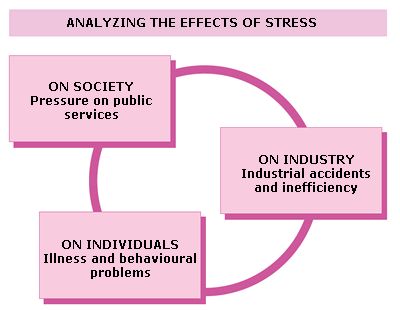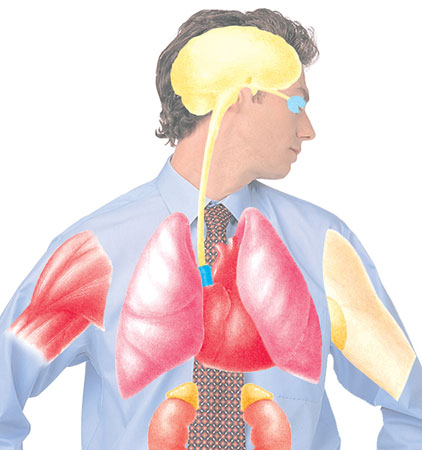On occasions, all of us experience stress. Beneficial stress can help
drive a few of us to become Olympic champions, but harmful stress can drive
others to despair. A force as powerful as that should always be handled with
respect.

The definition of stress
Stress in individuals is defined as any interference that disturbs a
person’s healthy mental and physical wellbeing. It occurs when the body is
required to perform beyond its normal range of capabilities. The results of
stress are harmful to individuals, families, society, and organizations, which
can suffer from “organizational stress”.
Its effect on society
The societal costs of stress are already high – and are
increasing steadily. Society bears the cost of public services such as
healthcare for those made ill by stress, pensions for early retirement brought
on by stress, and disability benefits for accidents occurring because of
stress. In addition to this, stress often makes people irritable, and this
affects the overall quality of everyone’s lives.
Its effect on companies
Stress costs industry over $150 billion a year in the US alone
– through absenteeism and reduced levels of performance by those who are
physically present but mentally absent. In the UK, as much as 60 per cent of
all absenteeism is believed to be caused by stress-related disorders. Anything
that can reduce the damaging effects of stress makes workers happier and
companies richer.
Its effect on the body
When the human body is placed under physical or psychological
stress, it increases the production of certain hormones, such as adrenaline and
cortisol. These hormones produce marked changes in heart rate, blood pressure
levels, metabolism, and physical activity. Although this physical reaction will
help you to function more effectively when you are under pressure for short
periods of time, it can be extremely damaging to the body in the long-term.
Symptoms of stress
The physical symptoms of stress can affect the whole body,
particularly the cardiac and respiratory systems.

Its effect on physical health and wellbeing
Long-term stress has been identified as one of the most prevalent
causes of numerous common conditions, including high blood pressure and heart
disease. It is now commonly thought that prolonged stress can also increase the
risk of psychological or psychiatric ailments. Behavioural changes caused by
stress, such as the increased and excessive use of alcohol or drugs, are also
linked to a marked decline in physical health.
When under an abnormal amount of stress, the risk of dependency on
alcohol is very high. Apart from major physical health problems caused by
excessive drinking, over-consumption of alcohol can also result in highly
strained and therefore stressful personal relationships, both in the home and
at work. Alcohol abuse, resulting in worker absenteeism, is reckoned to cost
the US economy more than $100 billion annually.
Prescribed drugs such as tranquillizers, while sometimes useful in
the short term to tackle the symptoms of anxiety, can be addictive and have
side effects such as loss of concentration, poor co-ordination, and dizziness.
Tranquillizers, by their very nature, are not a cure for stress since they do
not deal with its fundamental causes.
Its effect on emotions
Those who suffer from stress are far more likely to indulge in
destructive behaviour, which can have a high cost to themselves, to employers,
and to society. Typical symptoms such as mood swings and erratic behaviour may
alienate colleagues as well as friends and family. In some cases, this can
start a vicious circle of decreasing confidence, leading to more serious
emotional problems, such as depression.
Stress and mental health
The incidence of psychological disorders, such as panic attacks
and obsessive behaviour, increases with the build-up of long-term stress.
Worries can reach such a level that they surface as a frightening, painful
physical sensation, which can be mistaken for a heart attack. People under
prolonged stress are more prone to irrational fears, mood swings, and phobias,
and may experience fits of depression, anger, and irritability.
Its effect on decisions
Suffering from any level of stress can rapidly cause individuals to
lose their ability to make sound decisions, especially if their self-confidence
fails. This affects health, family, and career alike, since stress in one area
of life inevitably affects others. Someone suffering from stress may not heed
physical signs of illness, attributing them to the side-effects of stress.
Faulty decisions made in the workplace and at home may lead to accidents or
arguments, financial loss, or even the loss of a job.
Its effect on families
Stress can break up homes and families. The high divorce rates in
the West are due partly to the rapid increase in stress in the workplace,
especially where both partners are working full time. It is difficult to be
find the energy to be supportive to family and friends if work is very
difficult or you are afraid that you may lose your job.
When children are involved, stress can cause a conflict relating to
childcare and careers. Although we do not yet fully understand the long-term
impact of separation or divorce on children, we know that it is not the best
way to create a generation of stress-free individuals. This requires a very
careful balance of the demands of work and home.
Sorting out priorities
Stress is caused by a failure to balance conflicting demands.
Juggling work commitments, social life, and childcare may mean that not enough
time or energy can be devoted to any one activity.

Points to remember
Stress can be a killer. The Japanese have an officially
recognized condition called karoshi – death from stress caused by
too much work
Suffering from stress should not be considered a sign of
weakness.
Stress is infectious. It is stressful to live and work with
people who are suffering from stress.
Stress is produced by high demands in life combined with high
constraints and little support from colleagues or family.
There is no formula guaranteeing a stress-free life, but there are techniques for minimizing stress.
TIP
Learn how to spot your stress warning signals, and then act on them.
TIP
Do not be afraid to talk about situations that you find
stressful.
TIP
Take a stroll when you are stressed – it can help restore
your perspective.
TIP
Avoid the habit of taking work home with you every night.
TIP
Try to be aware of any changes in your eating and drinking
patterns.
TIP
“Talk truth to power” – do not be afraid to
tell your line manager what really goes on in the office.